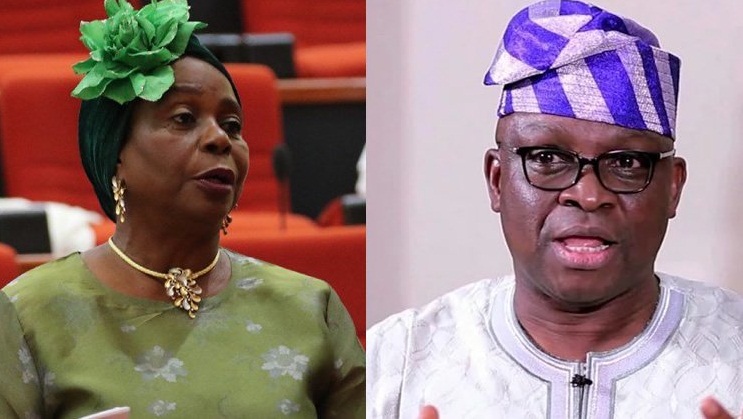Nigerians groan as prices of commodities soar

With an unpleasant facial expression that depicts weariness, Mrs. Ayomiku Immanuel, a resident on the mainland of Lagos walks awkwardly up and down the ancient Ojuwoye market in Mushin area of Lagos state, obviously worried about the persistent hike in the prices of groceries and other items.
For one, the thought of paying more for few commodities troubles her but after what seems like an endless and unproductive walk round the market, she finally settled for a paint of gari, spaghetti and a de’rica of rice which was sold to her at N400, N180 and N200 respectively as against N300, N130 and N150 the commodities were sold in the previous week.
Amidst murmuring, she exclaimed, “When is this persistent hike in the prices of commodities coming to an end?” and the grocer’s ready answer was, “na dollar o”.
Like many Nigerians, Mrs. Ayomiku rocks similar boat as inflation and depreciation of the Naira not only puncture their purchasing power, but it also subject them to an indescribable hardship as they strive to meet up with their daily needs.
It would be recalled that since the beginning of the year, prices of commodities particularly, food items have witnessed a sharp increase with a bag of rice which was previously sold for N9,500 now sells for between N12,000 or N12,500, while a big bag of white beans formerly N18,000 now sells for N19,000.
According to a February 16 report on inflation released by the National Bureau of Statistics, inflation rate in the country has increased by 8.80 percent, while on the average, inflation rate was between 9.38 percent from 2007 until 2016, reaching an all time high of 19.28 percent in January of 2007 and a record low of 0.49 percent in March of 2008.
In a survey conducted recently by The Daily Times on the effect of sharp rise in the prices of goods and services in relation to decline in purchasing power, some Nigerians express their views.
At the Tejuosho market in Yaba, Lagos, Ikenna Obi deals in second hand clothing for adults and babies.
“Until recently, according to him, business has been good but with the fall in the value of Naira and increase in prices of goods and services, coping with business is almost unbearable,” he told our correspondent.
“Before the prohibition on the importation of fairly used products in the country by the Federal government, trading in second hand products was profitable; it was a good and profitable business that was worth investing on. But with inflation and depreciation in the value of our Naira against the dollar, business has gone from good to bad. In fact, the situation is gradually forcing many of us out of business because of the intolerable increase in prices.”
Obi explains that under normal circumstances, a pair of fairly used jeans is sold for between N1000 and N1,500; but now, the least you can get it is N2000. He laments that the exchange rate is not encouraging for business at all but they hope that it will get better soon.
“Since I have been in this line of business, I have experienced both the good and the bad side of it, but I have never experienced it this bad. I could remember my last business trip, I hardly realise one third of the money I invested. If not for God’s intervention, I was almost forced out of business. Therefore, I am appealing to the Federal Government to address whatever problem there is with the economy and make the Naira stable for us businessmen to survive.”.
As Obi and other Nigerians pray for a positive turnaround in the economy, Mrs. Olaleye Yetunde, a wholesale grocer in Mushin area of Lagos Mainland was however pessimistic about any probable change in the economy.
Her argument is based on the premise that many traders have stockpiled goods they bought at the current high rate in their shops with the fear that inflation would persist and prices of commodities would continue to skyrocket.
She bares her mind: “Our expectation as traders is that there is not going to be an improvement in the economy sooner; at least not with the present exchange rate with the unclear economic policy of the present administration. For this reason, many of us have stockpiled goods in our various warehouses in the hope that, should the Naira continue to depreciate along with rising prices, we will not be caught unawares.
“But despite this, we have recorded low sales as customers are extremely cautious. The instability in the exchange rate of Naira is adversely affecting us and this of course accounts for low customer patronage and our poor sales. From this end, I want to plead with the President to expressly define the economic policies of his government and put the economy back on the right track.”
In his opinion, Fola Gabriel believes getting the economy back on the right track and checking inflation is top on the wish of many Nigerians.
He said, “The federal government needs to urgently address the challenges facing the economy because Nigerians are suffering. Imagine, an individual with a low income in this kind of economy, how do you think such person will survive?”
In as much as I take the present economic crisis as fallout of inefficiencies and corruption of past administrations in the country, necessary steps must be taken by this administration to minimise the impact of the inflation because Nigerians are suffering.”
It is the hope of every Nigerian that this government of change will take the bull called corruption by its horns soonest and begin an upward resuscitation of the decay that has eaten deep into the fibre of the economy.







